Nurturing Individual Creativity in Singapore
VerifiedAdded on 2020/05/08
|5
|1211
|123
AI Summary
This assignment delves into the factors influencing individual creativity, particularly focusing on Singapore. It examines how cultural background, creative problem-solving abilities, convergent and divergent thinking, and personal values contribute to the development and expression of creativity. The discussion highlights the unique characteristics of Singapore's culture and its impact on nurturing creative individuals.
Contribute Materials
Your contribution can guide someone’s learning journey. Share your
documents today.
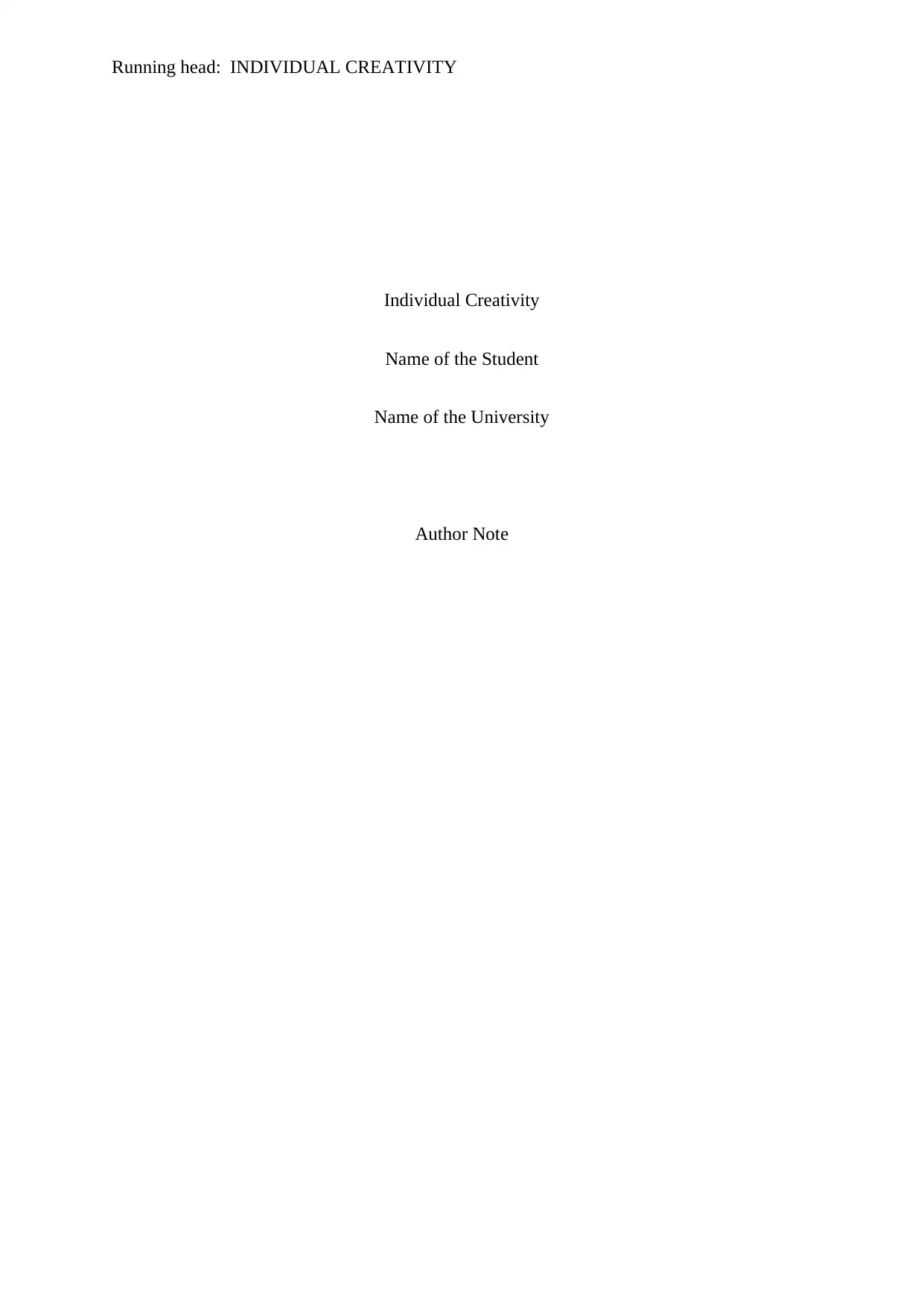
Running head: INDIVIDUAL CREATIVITY
Individual Creativity
Name of the Student
Name of the University
Author Note
Individual Creativity
Name of the Student
Name of the University
Author Note
Secure Best Marks with AI Grader
Need help grading? Try our AI Grader for instant feedback on your assignments.
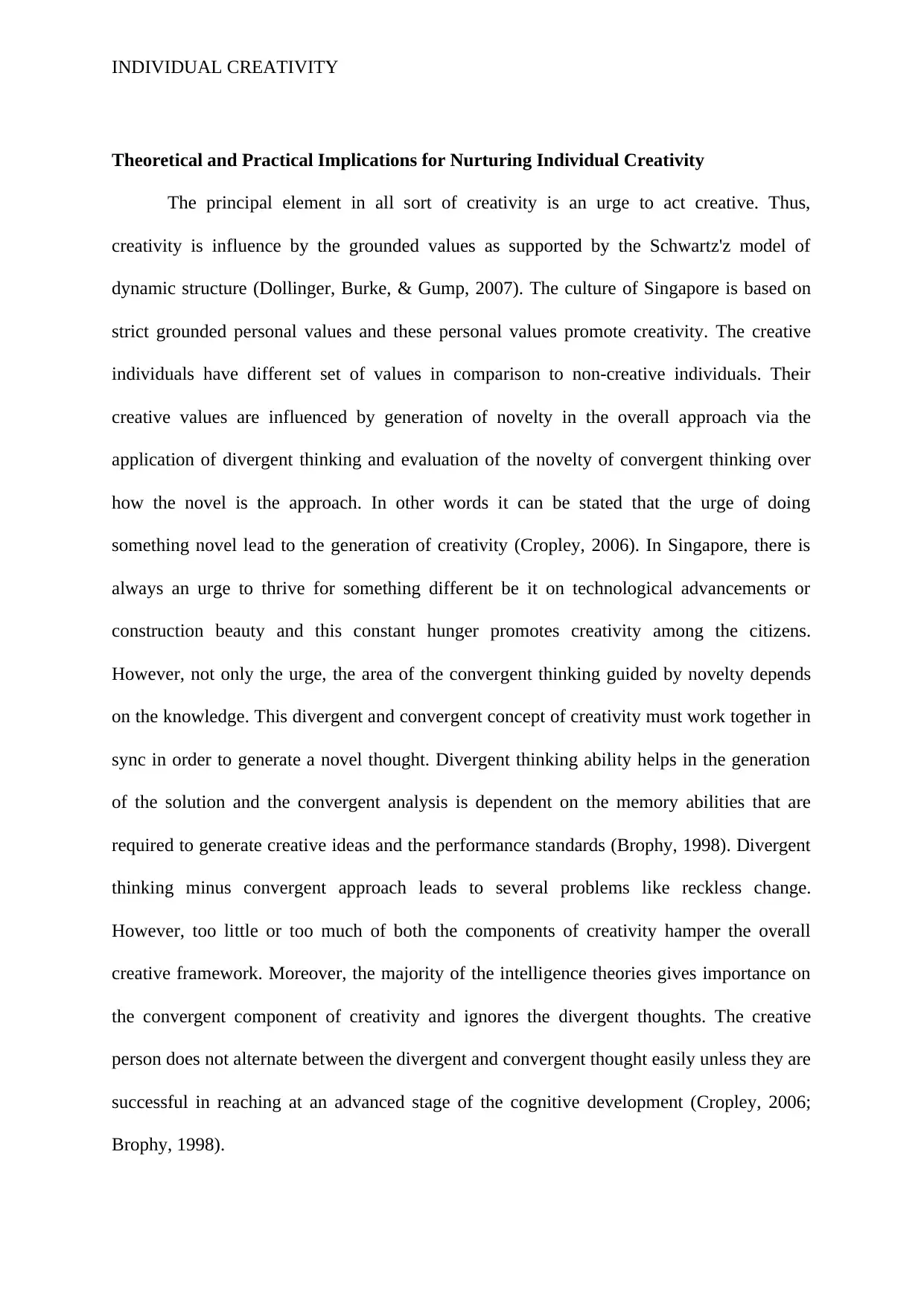
INDIVIDUAL CREATIVITY
Theoretical and Practical Implications for Nurturing Individual Creativity
The principal element in all sort of creativity is an urge to act creative. Thus,
creativity is influence by the grounded values as supported by the Schwartz'z model of
dynamic structure (Dollinger, Burke, & Gump, 2007). The culture of Singapore is based on
strict grounded personal values and these personal values promote creativity. The creative
individuals have different set of values in comparison to non-creative individuals. Their
creative values are influenced by generation of novelty in the overall approach via the
application of divergent thinking and evaluation of the novelty of convergent thinking over
how the novel is the approach. In other words it can be stated that the urge of doing
something novel lead to the generation of creativity (Cropley, 2006). In Singapore, there is
always an urge to thrive for something different be it on technological advancements or
construction beauty and this constant hunger promotes creativity among the citizens.
However, not only the urge, the area of the convergent thinking guided by novelty depends
on the knowledge. This divergent and convergent concept of creativity must work together in
sync in order to generate a novel thought. Divergent thinking ability helps in the generation
of the solution and the convergent analysis is dependent on the memory abilities that are
required to generate creative ideas and the performance standards (Brophy, 1998). Divergent
thinking minus convergent approach leads to several problems like reckless change.
However, too little or too much of both the components of creativity hamper the overall
creative framework. Moreover, the majority of the intelligence theories gives importance on
the convergent component of creativity and ignores the divergent thoughts. The creative
person does not alternate between the divergent and convergent thought easily unless they are
successful in reaching at an advanced stage of the cognitive development (Cropley, 2006;
Brophy, 1998).
Theoretical and Practical Implications for Nurturing Individual Creativity
The principal element in all sort of creativity is an urge to act creative. Thus,
creativity is influence by the grounded values as supported by the Schwartz'z model of
dynamic structure (Dollinger, Burke, & Gump, 2007). The culture of Singapore is based on
strict grounded personal values and these personal values promote creativity. The creative
individuals have different set of values in comparison to non-creative individuals. Their
creative values are influenced by generation of novelty in the overall approach via the
application of divergent thinking and evaluation of the novelty of convergent thinking over
how the novel is the approach. In other words it can be stated that the urge of doing
something novel lead to the generation of creativity (Cropley, 2006). In Singapore, there is
always an urge to thrive for something different be it on technological advancements or
construction beauty and this constant hunger promotes creativity among the citizens.
However, not only the urge, the area of the convergent thinking guided by novelty depends
on the knowledge. This divergent and convergent concept of creativity must work together in
sync in order to generate a novel thought. Divergent thinking ability helps in the generation
of the solution and the convergent analysis is dependent on the memory abilities that are
required to generate creative ideas and the performance standards (Brophy, 1998). Divergent
thinking minus convergent approach leads to several problems like reckless change.
However, too little or too much of both the components of creativity hamper the overall
creative framework. Moreover, the majority of the intelligence theories gives importance on
the convergent component of creativity and ignores the divergent thoughts. The creative
person does not alternate between the divergent and convergent thought easily unless they are
successful in reaching at an advanced stage of the cognitive development (Cropley, 2006;
Brophy, 1998).
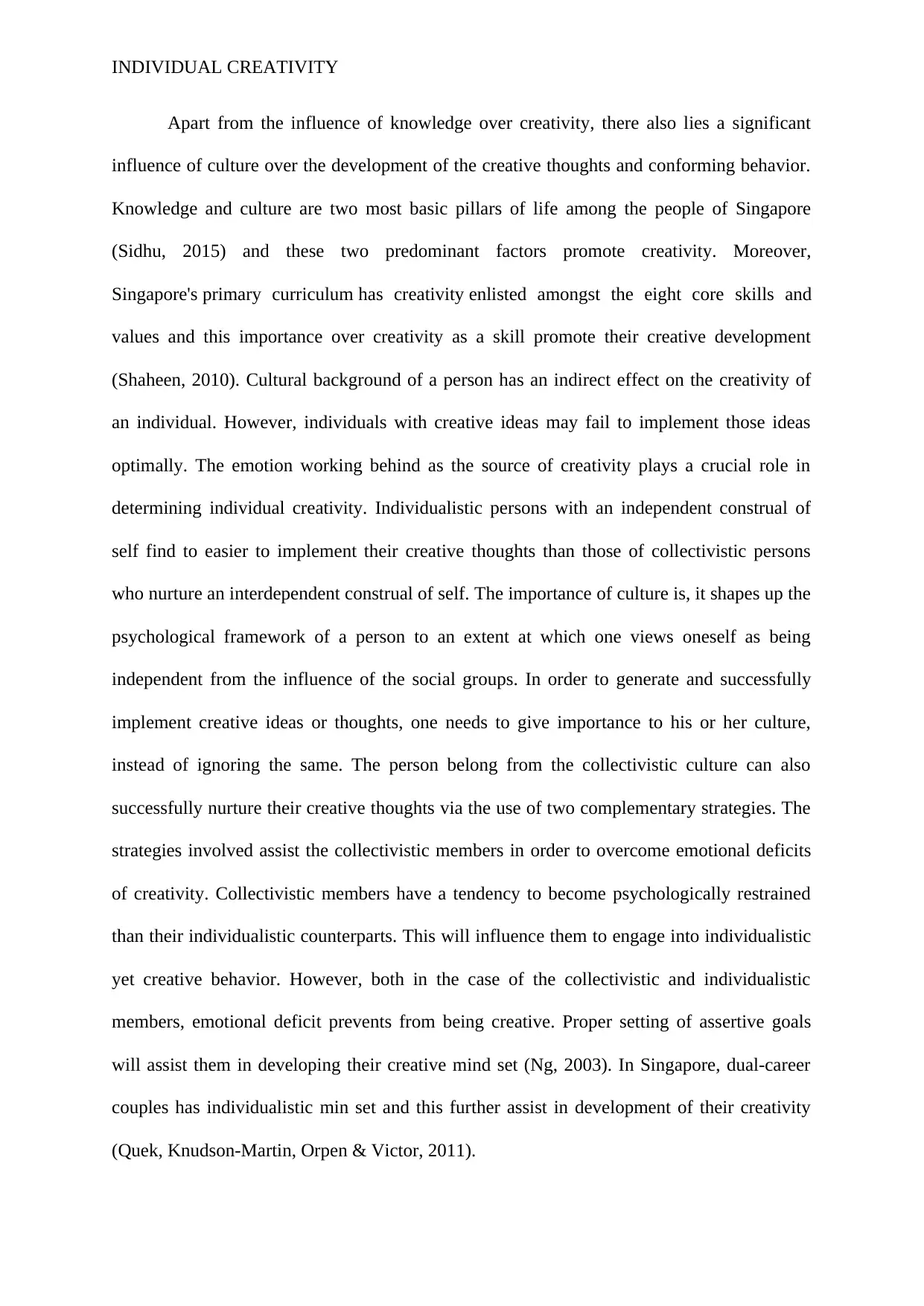
INDIVIDUAL CREATIVITY
Apart from the influence of knowledge over creativity, there also lies a significant
influence of culture over the development of the creative thoughts and conforming behavior.
Knowledge and culture are two most basic pillars of life among the people of Singapore
(Sidhu, 2015) and these two predominant factors promote creativity. Moreover,
Singapore's primary curriculum has creativity enlisted amongst the eight core skills and
values and this importance over creativity as a skill promote their creative development
(Shaheen, 2010). Cultural background of a person has an indirect effect on the creativity of
an individual. However, individuals with creative ideas may fail to implement those ideas
optimally. The emotion working behind as the source of creativity plays a crucial role in
determining individual creativity. Individualistic persons with an independent construal of
self find to easier to implement their creative thoughts than those of collectivistic persons
who nurture an interdependent construal of self. The importance of culture is, it shapes up the
psychological framework of a person to an extent at which one views oneself as being
independent from the influence of the social groups. In order to generate and successfully
implement creative ideas or thoughts, one needs to give importance to his or her culture,
instead of ignoring the same. The person belong from the collectivistic culture can also
successfully nurture their creative thoughts via the use of two complementary strategies. The
strategies involved assist the collectivistic members in order to overcome emotional deficits
of creativity. Collectivistic members have a tendency to become psychologically restrained
than their individualistic counterparts. This will influence them to engage into individualistic
yet creative behavior. However, both in the case of the collectivistic and individualistic
members, emotional deficit prevents from being creative. Proper setting of assertive goals
will assist them in developing their creative mind set (Ng, 2003). In Singapore, dual-career
couples has individualistic min set and this further assist in development of their creativity
(Quek, Knudson-Martin, Orpen & Victor, 2011).
Apart from the influence of knowledge over creativity, there also lies a significant
influence of culture over the development of the creative thoughts and conforming behavior.
Knowledge and culture are two most basic pillars of life among the people of Singapore
(Sidhu, 2015) and these two predominant factors promote creativity. Moreover,
Singapore's primary curriculum has creativity enlisted amongst the eight core skills and
values and this importance over creativity as a skill promote their creative development
(Shaheen, 2010). Cultural background of a person has an indirect effect on the creativity of
an individual. However, individuals with creative ideas may fail to implement those ideas
optimally. The emotion working behind as the source of creativity plays a crucial role in
determining individual creativity. Individualistic persons with an independent construal of
self find to easier to implement their creative thoughts than those of collectivistic persons
who nurture an interdependent construal of self. The importance of culture is, it shapes up the
psychological framework of a person to an extent at which one views oneself as being
independent from the influence of the social groups. In order to generate and successfully
implement creative ideas or thoughts, one needs to give importance to his or her culture,
instead of ignoring the same. The person belong from the collectivistic culture can also
successfully nurture their creative thoughts via the use of two complementary strategies. The
strategies involved assist the collectivistic members in order to overcome emotional deficits
of creativity. Collectivistic members have a tendency to become psychologically restrained
than their individualistic counterparts. This will influence them to engage into individualistic
yet creative behavior. However, both in the case of the collectivistic and individualistic
members, emotional deficit prevents from being creative. Proper setting of assertive goals
will assist them in developing their creative mind set (Ng, 2003). In Singapore, dual-career
couples has individualistic min set and this further assist in development of their creativity
(Quek, Knudson-Martin, Orpen & Victor, 2011).
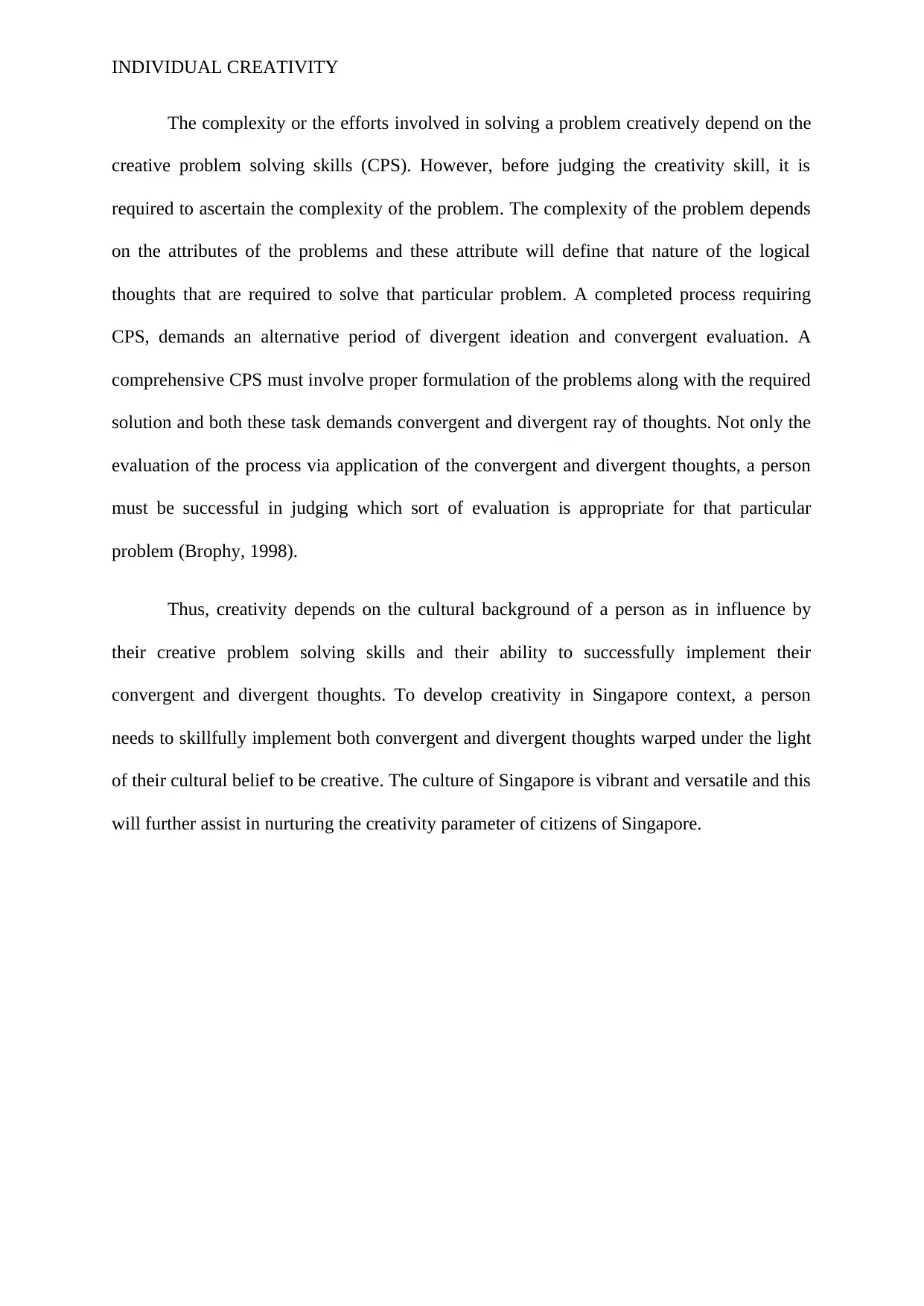
INDIVIDUAL CREATIVITY
The complexity or the efforts involved in solving a problem creatively depend on the
creative problem solving skills (CPS). However, before judging the creativity skill, it is
required to ascertain the complexity of the problem. The complexity of the problem depends
on the attributes of the problems and these attribute will define that nature of the logical
thoughts that are required to solve that particular problem. A completed process requiring
CPS, demands an alternative period of divergent ideation and convergent evaluation. A
comprehensive CPS must involve proper formulation of the problems along with the required
solution and both these task demands convergent and divergent ray of thoughts. Not only the
evaluation of the process via application of the convergent and divergent thoughts, a person
must be successful in judging which sort of evaluation is appropriate for that particular
problem (Brophy, 1998).
Thus, creativity depends on the cultural background of a person as in influence by
their creative problem solving skills and their ability to successfully implement their
convergent and divergent thoughts. To develop creativity in Singapore context, a person
needs to skillfully implement both convergent and divergent thoughts warped under the light
of their cultural belief to be creative. The culture of Singapore is vibrant and versatile and this
will further assist in nurturing the creativity parameter of citizens of Singapore.
The complexity or the efforts involved in solving a problem creatively depend on the
creative problem solving skills (CPS). However, before judging the creativity skill, it is
required to ascertain the complexity of the problem. The complexity of the problem depends
on the attributes of the problems and these attribute will define that nature of the logical
thoughts that are required to solve that particular problem. A completed process requiring
CPS, demands an alternative period of divergent ideation and convergent evaluation. A
comprehensive CPS must involve proper formulation of the problems along with the required
solution and both these task demands convergent and divergent ray of thoughts. Not only the
evaluation of the process via application of the convergent and divergent thoughts, a person
must be successful in judging which sort of evaluation is appropriate for that particular
problem (Brophy, 1998).
Thus, creativity depends on the cultural background of a person as in influence by
their creative problem solving skills and their ability to successfully implement their
convergent and divergent thoughts. To develop creativity in Singapore context, a person
needs to skillfully implement both convergent and divergent thoughts warped under the light
of their cultural belief to be creative. The culture of Singapore is vibrant and versatile and this
will further assist in nurturing the creativity parameter of citizens of Singapore.
Secure Best Marks with AI Grader
Need help grading? Try our AI Grader for instant feedback on your assignments.
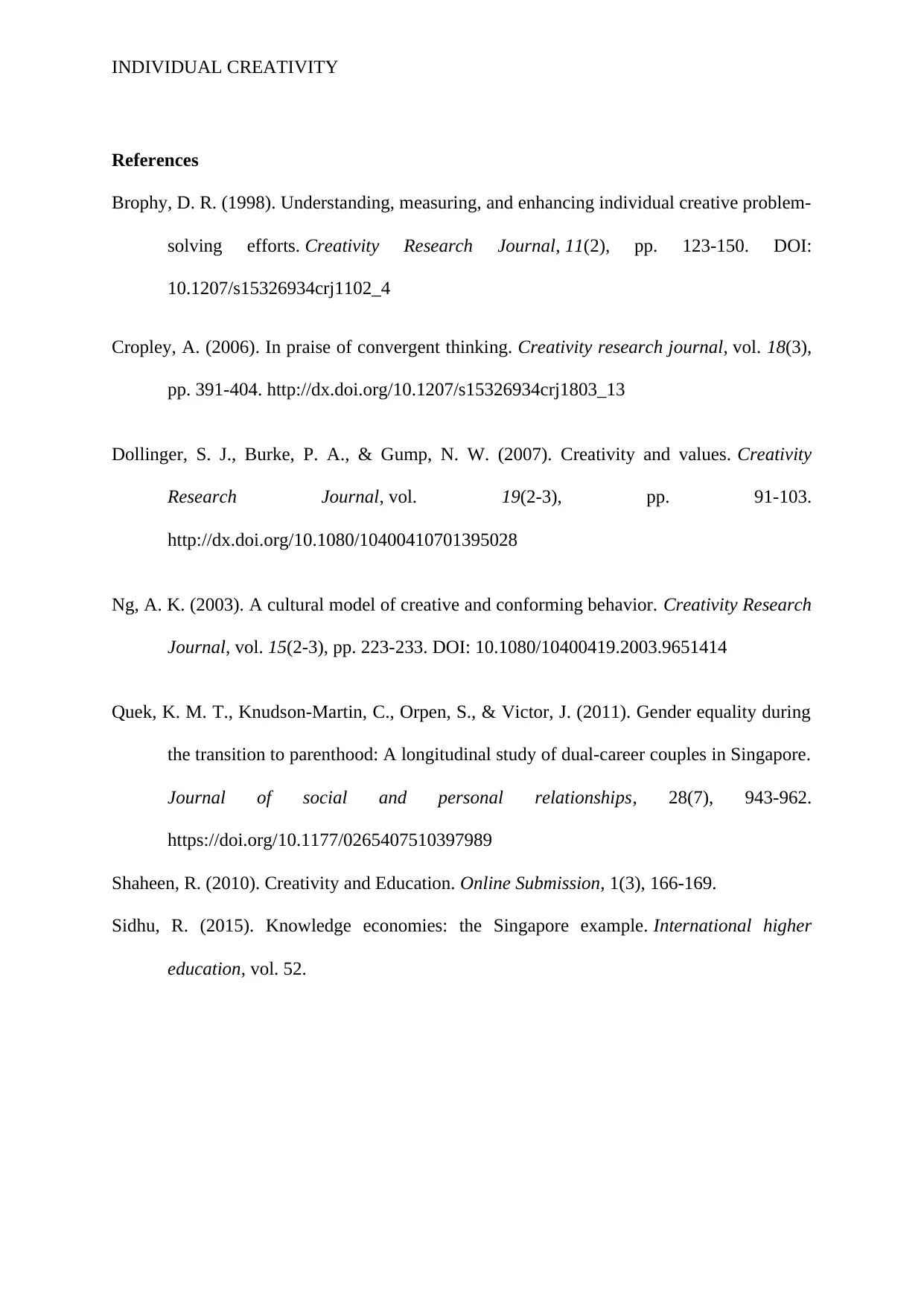
INDIVIDUAL CREATIVITY
References
Brophy, D. R. (1998). Understanding, measuring, and enhancing individual creative problem-
solving efforts. Creativity Research Journal, 11(2), pp. 123-150. DOI:
10.1207/s15326934crj1102_4
Cropley, A. (2006). In praise of convergent thinking. Creativity research journal, vol. 18(3),
pp. 391-404. http://dx.doi.org/10.1207/s15326934crj1803_13
Dollinger, S. J., Burke, P. A., & Gump, N. W. (2007). Creativity and values. Creativity
Research Journal, vol. 19(2-3), pp. 91-103.
http://dx.doi.org/10.1080/10400410701395028
Ng, A. K. (2003). A cultural model of creative and conforming behavior. Creativity Research
Journal, vol. 15(2-3), pp. 223-233. DOI: 10.1080/10400419.2003.9651414
Quek, K. M. T., Knudson-Martin, C., Orpen, S., & Victor, J. (2011). Gender equality during
the transition to parenthood: A longitudinal study of dual-career couples in Singapore.
Journal of social and personal relationships, 28(7), 943-962.
https://doi.org/10.1177/0265407510397989
Shaheen, R. (2010). Creativity and Education. Online Submission, 1(3), 166-169.
Sidhu, R. (2015). Knowledge economies: the Singapore example. International higher
education, vol. 52.
References
Brophy, D. R. (1998). Understanding, measuring, and enhancing individual creative problem-
solving efforts. Creativity Research Journal, 11(2), pp. 123-150. DOI:
10.1207/s15326934crj1102_4
Cropley, A. (2006). In praise of convergent thinking. Creativity research journal, vol. 18(3),
pp. 391-404. http://dx.doi.org/10.1207/s15326934crj1803_13
Dollinger, S. J., Burke, P. A., & Gump, N. W. (2007). Creativity and values. Creativity
Research Journal, vol. 19(2-3), pp. 91-103.
http://dx.doi.org/10.1080/10400410701395028
Ng, A. K. (2003). A cultural model of creative and conforming behavior. Creativity Research
Journal, vol. 15(2-3), pp. 223-233. DOI: 10.1080/10400419.2003.9651414
Quek, K. M. T., Knudson-Martin, C., Orpen, S., & Victor, J. (2011). Gender equality during
the transition to parenthood: A longitudinal study of dual-career couples in Singapore.
Journal of social and personal relationships, 28(7), 943-962.
https://doi.org/10.1177/0265407510397989
Shaheen, R. (2010). Creativity and Education. Online Submission, 1(3), 166-169.
Sidhu, R. (2015). Knowledge economies: the Singapore example. International higher
education, vol. 52.
1 out of 5
Your All-in-One AI-Powered Toolkit for Academic Success.
+13062052269
info@desklib.com
Available 24*7 on WhatsApp / Email
![[object Object]](/_next/static/media/star-bottom.7253800d.svg)
Unlock your academic potential
© 2024 | Zucol Services PVT LTD | All rights reserved.

